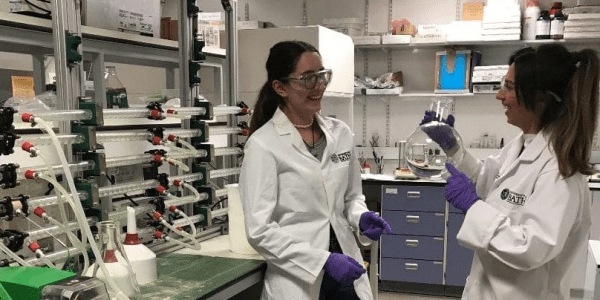Emily Griffiths’ placement at the University of Bolton
| Nuffield Research Placement student, 2011
University of Bolton Investigating the resistivity of zinc oxide nanorods |
|---|
The project that I undertook with a PhD student was investigating the resistivity of zinc oxide nanorods. The research I helped to conduct was leading to the discovery of more effective batteries and capacitors, and the use of them in electrical goods.
What was the highlight/best bit of your placement?
The highlight of my placement was being given the opportunity to work alongside a PhD student and having high-spec equipment at my disposal to use in order to aid my research.
I was fortunate enough to have been placed with a student who went above and beyond what was expected of him, and not only did I learn about the theory behind his research, but also how to get the most out of education.
I believe that it was because of the experiences that I gained from partaking in the NRP that I was able to be granted a place on the course, and I am now thriving as a STEM student at university.”Emily Griffiths
What was the your least favourite part of the placement?
On the placement, I found researching and studying topics, past theories and previous case studies to be challenging and difficult. However, now that I am studying at university level, I have found this previous experience invaluable, as it has enabled me to carry forward these skills to use when completing assignments.
What is your current role? If you are currently studying, what course are you doing?
I am currently studying where I undertook my research placement, the University of Bolton. The course I am studying is Biomedical Engineering.
What path did you take after finishing your NRP and how has that led you to where you are today?
A year after I completed my NRP, I was unfortunately involved in a car accident, which left me unable to return to education for a number of years. Due to this, I obtained lower A-Level grades than were expected. In September of last year, I started my degree course at the University of Bolton. I believe that it was because of the experiences that I gained from partaking in the NRP that I was able to be granted a place on the course, and I am now thriving as a STEM student at university.
Did your Nuffield Research Placement have an effect on the choices that you made after finishing school/college/university?
My placement has been invaluable to my career path. I have discovered a love for research that I didn’t know I had and has given me experience in the software that I will be using at university, giving me an advantage in my course. I have realised that I am not only interested in the field of environmental science but I also really enjoy the real-life application of the field. It is one thing to like and enjoy and subject, it is a different thing to apply it to real-life careers, this placement has helped me to realise that I am also interested in the careers available in the field.
If you could give one piece of advice to Nuffield students about to start a placement what would it be?
Ask questions – lots of questions! I would strongly advise any prospective student about to start a placement that they absolutely make the most of the experience and use all the tools at their disposal. Be persistent if you don’t understand something – that’s what they are there for. But, above all, enjoy the experience!
What would your advice be to young people thinking about a career in STEM?
A career in STEM is an excellent choice, especially for young women, as there are countless opportunities for exciting career prospects and the possibility to work in a field where you are able to help and enrich other lives.




